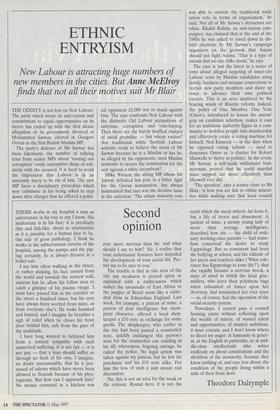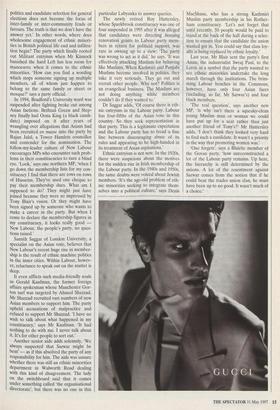ETHNIC ENTRYISM
New Labour is attracting huge numbers of
new members in the cities. But Anne McElvoy
finds that not all their motives suit Mr Blair
THE ODDITY is not lost on New Labour. The party which wears its anti-racism and commitment to equal opportunities on its sleeve has ended up with the first sleaze allegation of its government directed at Mohammed Sarwar, elected in Glasgow Govan as the first British Muslim MP.
The party's defence of Mr Sarwar has been lukewarm: the number of rallying cries from senior MPs about 'rooting out corruption' vastly outnumber those of soli- darity with the accused. It is hard to avoid the impression that Labour is in an unseemly hurry to be rid of him. The new MP faces a disciplinary procedure which may culminate in his being asked to step down after charges that he offered a politi- cal opponent £5,000 not to stand against him. The case confronts New Labour with the distinctly Old Labour accusations of entryism, corruption and vote-buying. Then there are the barely muffled charges of racial prejudice — but whose racism? Are traditional white Scottish Labour activists ready to believe the worst of Mr Sarwar because he is a Muslim or has he, as alleged by his opponents, used Muslim networks to secure the nomination for the seat against a white incumbent?
Mike Watson, the sitting MP whom Mr Sarwar defeated last year in a bitter fight for the Govan nomination, has always maintained that race was the decisive issue in the selection: 'The ethnic minority vote was able to outvote the traditional trade union vote in terms of organisation,' he said. Not all of Mr Sarwar's detractors are white. Khalid Rahim, an anti-racism cam- paigner, has claimed that at the end of the 1980s he was asked to stand down in dis- trict elections by Mr Sarwar's campaign organisers on the grounds that Asians should not fight Asians. 'That is a type of racism that no one talks about,' he says.
The case is just the latest in a series of rows about alleged targeting of inner-city Labour seats by Muslim candidates using family, business and mosque connections to recruit new party members and shore up votes to advance their own political careers. This is an area unstirred by the bracing winds of Blairite reform. Indeed, the policy of One Member, One Vote (Omov), introduced to lessen the unions' grip on candidate selection, makes it easy for an ambitious authority figure in a com- munity to mobilise people into membership and effectively create a voting machine for himself. Neil Kinnock — in the days when he opposed voting reform — used to denounce Omov as 'a charter for Robert Maxwells to thrive in politics'. In the event, Mr Sarwar, a self-made millionaire busi- nessman, proved that he could marshal mass support far more effectively than Maxwell ever did.
`The question', says a source close to Mr Blair, 'is how you are fair to ethnic minori- ties while making sure that local council politics and candidate selection for general elections does not become the focus of inter-family or, inter-community feuds or favours. The truth is that we don't have the answer yet.' In other words, where does wholesome engagement of ethnic minori- ties in British political life end and infiltra- tion begin? The party which finally rooted out Militant entryism when Mr Kinnock banished the hard Left has less room for manoeuvre when it comes to the ethnic minorities. 'How can you find a wording which stops someone signing up multiple members, all of whom just happen to belong to the same family or street or mosque?' says a party official.
In 1994, Bradford's University ward was suspended after fighting broke out among Asian factions. Bethnal Green and Step- ney finally had Oona King (a black candi- date) imposed on it after years of wrangling over allegations that Asians had been recruited en masse into the party by Rajan Jalal, a Tower Hamlets councillor and contender for the nomination. The follow-my-leader culture of New Labour encourages MPs who encounter such prob- lems in their constituencies to turn a blind eye. 'Look,' says one northern MP, 'when I go down the membership lists for my con- stituency I find that there are rows on rows of Husseins. They've used one cheque to pay their membership dues. What am I supposed to do? They might just have joined because they were so impressed by Tony Blair's vision. Or they might have been signed up by someone who wants to make a career in the party. But when I come to declare the membership figures in my constituency, it looks really good New Labour, the people's party, no ques- tions raised.'
Samith Saggar of London University, a specialist on the Asian vote, believes that New Labour's recent huge rise in member- ship is the result of ethnic machine politics in the inner cities. Within Labour, howev- er, reluctance to speak out on the matter is deep.
It even afflicts such media-friendly souls as Gerald Kaufman, the former foreign affairs spokesman whose Manchester Gor- ton turf was targeted by Ahmed Shazzad. Mr Shazzad recruited vast numbers of new Asian members to support him. The party upheld accusations of malpractice and refused to support Mr Shazzad. 'I have no wish to talk about what happened in my constituency,' says Mr Kaufman. 'It had nothing to do with me. I never talk about it. It's for other people to sort out.'
Another senior aide adds solemnly, 'We always suspected that Sarwar might be bent' — as if this absolved the party of any responsibility for him. The aide was unsure whether there was still an ethnic minorities department in Walworth Road dealing with this kind of disagreement. The lady on the switchboard said that it comes under something called 'the organisational directorate', but there was no one in this particular Lubyanka to answer queries.
The newly retired Roy Hattersley, whose Sparkbrook constituency was one of four suspended in 1995 after it was alleged that candidates were directing housing renovation grants to Labour party mem- bers in return for political support, was rare in owning up to a view: 'The party was wrong to act as it did,' he says. 'It was effectively attacking Muslims for behaving like Muslims. When Kashmiri and Punjabi Muslims become involved in politics, they take it very seriously. They go out and recruit other people. Why not? Politics is an evangelical business. The Muslims are not doing anything white members couldn't do if they wanted to.'
Dr Saggar adds, 'Of course there is eth- nic entryism in the Labour party. Labour has four-fifths of the Asian vote in this country. So they seek representation in that party. This is a legitimate expectation and the Labour party has to tread a fine line between discouraging abuse of its rules and appearing to be high-handed in its treatment of Asian aspirations.'
Ethnic entryism is not new. In the 1920s, there were suspicions about the motives for the sudden rise in Irish membership of the Labour party. In the 1940s and 1950s, the same doubts were voiced about Jewish members. 'It's the age-old problem of eth- nic minorities seeking to integrate them- selves into a political culture,' says Denis MacShane, who has a strong Kashmiri Muslim party membership in his Rother- ham constituency. 'Let's not forget that until recently, 50 people would be paid to stand at the back of the hall during a selec- tion to ensure that the candidate the union wanted got in. You could say that class loy- alty is being replaced by ethnic loyalty.'
Last year, Mr Blair sent the party's first Asian, the industrialist Swraj Paul, to the Lords as a symbol that the party wanted to see ethnic minorities undertake the long march through the institutions. The brim- ming Labour benches in the Commons, however, have only four Asian faces (including, so far, Mr Sarwar's) and four black members.
`The real question', says another new MP, is why isn't there a squeaky-clean young Muslim man or woman we could have put up for a seat rather than just another friend of Tony's?' Mr Hattersley adds, 'I don't think they looked very hard to find such a candidate. It wasn't a priority in the way that promoting women was.'
`One forgets', says a Blairite member of the Govan party, 'how unreconstructed a lot of the Labour party remains. Up here, the hierarchy is still determined by the unions. A lot of the resentment against Sarwar comes from the notion that if he could beat the trades union clan, he must have been up to no good. It wasn't much of a choice.'



































































 Previous page
Previous page